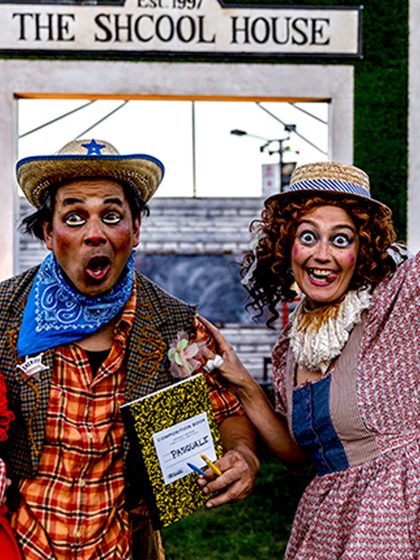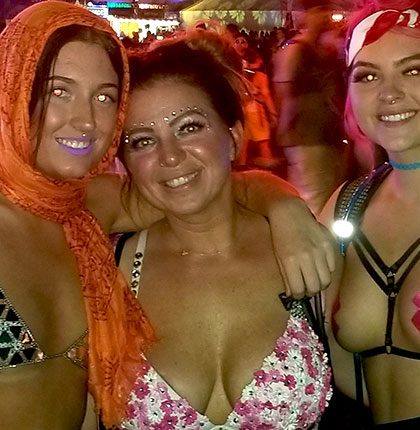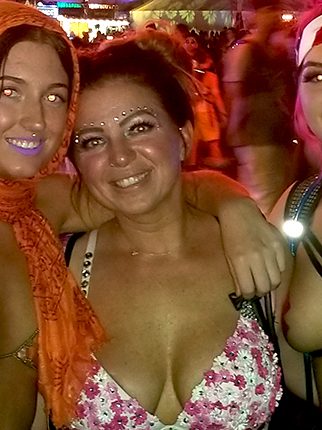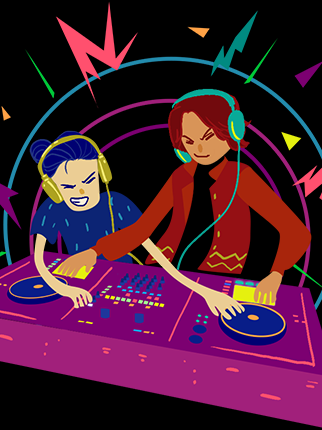My Life As: A Nightclub Clown
In this ongoing series, we investigate the realities and behind-the-scenes action of some of the wildest jobs in the dance music world.

Your craziest night in Vegas is just another day at the office for Brett Alters. As a character and clown at Light, the Cirque du Soleil-partnered nightclub at Mandalay Bay, his nights run the gamut from performing magic in a top hat to running around in an Elmo suit to presenting bottle service to VIPs. When dangling acrobats and A-list headliners aren’t enough, Alters is there to kick clubgoing experiences up a notch with antics designed to suck guests into Cirque’s surreal party world.
But clowning around is serious work. Having trained in drama at NYU’s Tisch School of the Arts, Alters also performs in the Vegas shows Le Reve by Franco Dragone and Cirque’s Love, often heading straight from the theater to the club. We talked to him about life on the job and what it’s like to have one of the most unique gigs in Vegas clubland.
What’s an average night for you at Light?
There are a few things I do regularly, and then every night there’s always some kind of special different request that’s created specifically for someone.
When the club opens up around 10, I’ll stand at the door and play with people in line to keep them entertained as they’re heading in, because the lines can be extremely boring. It’s kind of a taxing process waiting to get in, so Cirque provides entertainers to make that process more stomachable. People really enjoy it.
“I’m not above anything as an artist. One night we had a VIP guest whose nickname was Elmo, so I wore an Elmo costume all night.”
After that, we basically have about eight to 10 five-minute shows per night that we perform in. There’s a giant stage at Light and platforms where dancers and acrobats can perform, rigging where they can fly around, and features like a giant cage and a throne that we interact with. There’s a lot of atmosphere—characters like me walking around the club, dancers in incredible costumes, amazing visuals.
After the club fills up, my job is really about table service. I’ll go to each table and do everything from simple photo ops to some magic to comedy to other live performances. All non-verbal and all very physical. If you get a table, you’re gonna see my show, and that’s kind of a bonus on top of all the other entertainment the club provides.
People aren’t necessarily expecting you to show up, either. How do you feel out what a table might enjoy or not enjoy? How do you interact with people in that kind of environment?
I think we’re the first nightclub to have someone like me. I’ve been here about seven months, and there was a huge learning curve at first to figure out what worked and what didn’t. It took time, but now we have a guaranteed, will-entertain-people formula, which is why I love the job so much. I had a lot of fun creating it.
My character is always evolving. Right now I’m playing this kind of ringmaster/impresario/magic guy named “Watts-on.” What he does at tables is really a case-by-case, touch-and-go thing. You’ve got to feel the vibe of the table to know if what you’re doing is gonna suit them. If there’s a lot of crazy people, I might enter in a more subtle way and kind of just appear. If there’s a low-energy table, I might try to break the space more wildly.
Something I really like to do is walk up and pour myself a drink at someone’s table. Ninety percent of the time, people are like, “Hey, who the hell is this guy?” When people are happy about it, that’s great. When people are upset, that’s even better, because then I play off of it with a magic trick and make it clear who I am, and they get into it. Then it’s just dealing with the client—like, is it the type of person who wants his friends to be impressed? Is this the type of person who likes attention? Who’s trying to show off to a love interest? I kind of try to figure that out with the mood and tailor it accordingly.
You also have to do things like help deliver bottle service or accommodate VIPs. That’s pretty different from the traditional stage shows you’re used to working in.
I’m not above anything as an artist. One night we had a VIP guest whose nickname was Elmo, so I wore an Elmo costume all night. I’ve grabbed a client, dressed him up like a woman, and paraded him around onstage. When you’re in a dark, loud nightclub and your character doesn’t speak, but you still have to grab the attention of a table full of people who’ve been drinking, you really have to convince them with your performance. So it definitely helps keep my chops up. It’s a great chance to improve those skills.
Did you enjoy going to clubs before you got this job?
It’s not my scene, for sure, clubs and EDM and all that. But it’s actually kind of opened my eyes. At first I was like, “Why would people spend their money on this? Why would they be getting drunk like this?” But after some reflection, I realized that was more of my own issues that were coming out. I have hobbies and things I enjoy that I spend money and time on, and this is just like that for people. I live here in Vegas. I won’t go to a club unless someone knows a guy and has a table. I go to a club like four times a year because it’s someone’s birthday or a friend is in town. But my perspective shifted because I realized that for some people this is like the craziest, most insane, fun night of their life. I want to help them enjoy it.
What’s the biggest challenge of what you do?
The biggest challenge, besides my initial attitude, is not getting in other employees’ way. There are hardworking people at these nightclubs who are not performers. And I’m trying to always be super aware of the busser running through with a 50-pound bucket of ice, or the hostess trying to get her client to pay the bill, and they’re splitting it on 10 credit cards. Everybody is trying to work as such a cohesive unit, and since I’m in the rush of it all, I have to be mindful and respectful. It’s a spokes-and-gear environment. I am not the most important thing at that club. No one is. The whole club has to work together to make things happen.
The other challenging thing is that sometimes the hours are a little hard. It’s late, and it’s a very different environment. You’re not sitting backstage between shows having a cup of tea. You’re sitting backstage and it’s loud and late, and you think you have a 10-minute break; and then they’re like, “Oh, we have a bottle service!” and you have to get off your feet and do it. Some nights I know I’m gonna have to do 40 tables and be on my feet for 30 minutes at a time with a small break. That can be daunting sometimes, but that’s any show. I’ve found myself on nights when I’m tired, crossing my fingers it’s not busy, and some nights it’s super, super busy and I’m having a great time. But artists try to be flexible. I will say that Light and Cirque compensate performers very well and very fairly for the amount of work we do. And I hope other nightclubs are doing that. It’s hard work, and I don’t think anyone feels like they’re being taken advantage of monetarily, and that’s why it’s okay for us to work our butts off.

What do you enjoy most about working at Light?
I love the other people I work with. Everyone’s here because, at the beginning, it was this exciting new thing that hadn’t been done, and everyone was interested to see what it would be. It’s fun, it’s challenging, and I think we all have this weird sense of loyal enjoyment of being with each other and seeing the interesting things that happen at work. We’ll see everything from celebrities just hanging out, to some weird rumble in the club and security gets peacocked out to someone spending a ridiculous amount of money in one night, or someone just having the best night of their life. I think that’s why people enjoy the job—we’re the active observers and facilitators of a total range of human experiences for other people. And then I’m sharing those experiences with my coworkers. Sometimes there’s just really good stuff like that. It’s chicken soup for the drunk soul.
How do you deal with the inevitable customers who’ve had a little too much to drink or are getting rowdy?
There’s like a two-hour period throughout the night where people are in the right zone. Before that, people are arriving and getting situated. People are still kind of nervous, and the edge is still on. That’s not a good time. Then this two-hour period starts, usually at about 11 or 12, and I start doing my stuff, and people are just getting a little tipsy or are still sober enough where everything’s good. After a certain hour, people are just in general way too unfocused and rowdy. Not like they’re gonna be mean or put me in danger, but they’re having such a good time that they want to take it to the next level and be part of the show. When that happens, I usually just go out in costume and play with people and take pictures and have fun.
What’s a favorite story or crazy request you’ve had while on the job?
There’s this guy—his thing is ripping people’s shirts open so the buttons pop off—his friends, the host who brought him, anyone. He has like, the technique. So I knew when I went to that table and saw a bunch of dudes with their shirts ripped open and buttons popped off, I’d have to be prepared. I changed into my backup shirt. Then I walked up to the table, and he’s like, “Whooo’s this guy?” and I can see him like, calculating. As I was doing a trick, I saw him reaching for it, and I just turned and ripped my shirt open. I shook my finger at him like, “Nuh-uh! Not this time!” The guys went insane. He was just flabbergasted that I caught him. I think he still grabbed one of my buttons and ripped it off.
Andrea Domanick is a journalist who lives in Las Vegas. Yes, people really live there. She’s on Twitter and Facebook.






